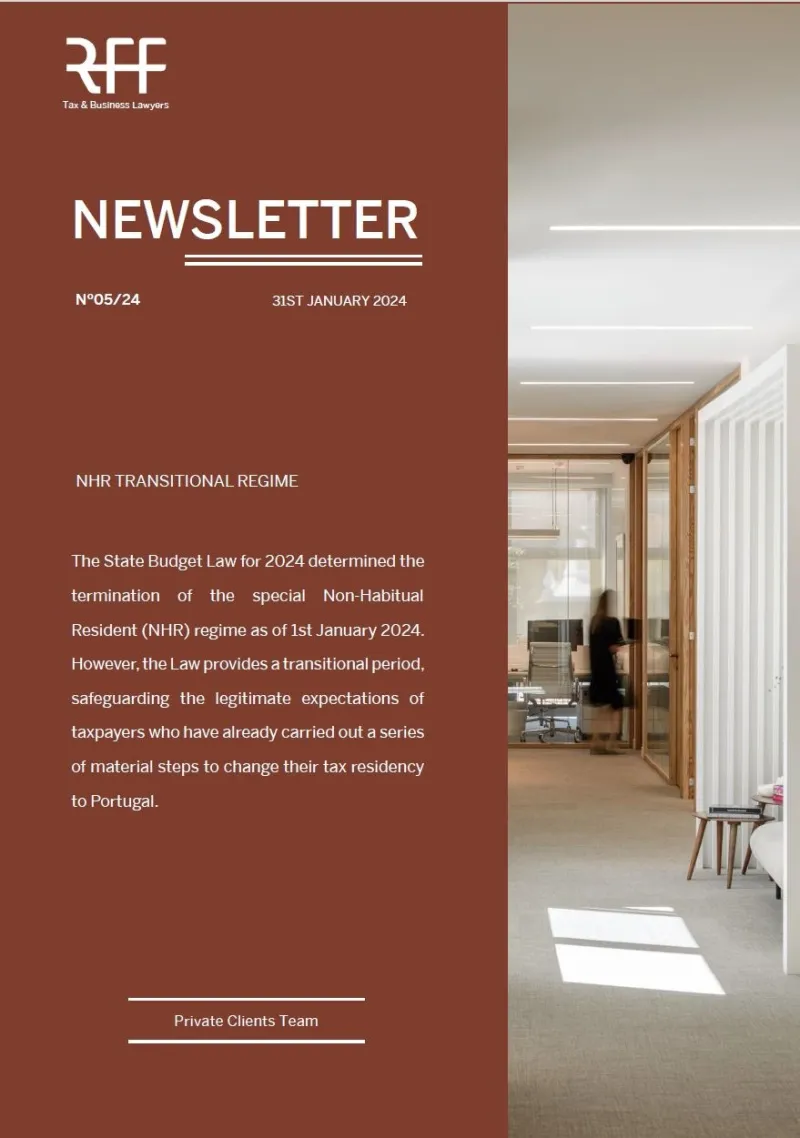Non-Habitual Resident Transitional Regime

Non-Habitual Resident Transitional Regime
The State Budget Law for 2024 determined the termination of the special Non-Habitual Resident (NHR) regime as of 1st January 2024. However, the Law provides a transitional period, safeguarding the legitimate expectations of taxpayers who have already carried out a series of material steps to change their tax residency to Portugal.
INTRODUCTION
The NHR regime, introduced by Decree-Law no. 249/2009, the 23rd September, with the aim of attracting high net worth individuals as well as highly qualified professionals, brought tax competitiveness and attracted foreign investment to Portugal.
However, as they considered the regime had already produced the desired effects, the Government decided to announce, in October 2023, its termination, having subsequently clarified its terms in the new State Budget Law (LOE).
THE MITIGATION RULES
Among the various changes approved by LOE 2024, which came into force on 1st January 2024, some mitigation rules for the NHR regime were determined, with the purpose of safeguarding the cases of taxpayers who, meeting the established criteria, wish to relocate to Portugal, under this special regime, in 2024 onwards, namely applicants who:
a) are already registered as an NHR in Portugal on the date this proposal comes into force;
b) on the 31st December 2023, meet the conditions to qualify as residents for tax purposes in Portuguese territory;
c) become residents for tax purposes by 31st December 2024 and who declare, for the purposes of their registration as a non-habitual resident, that they have one of the following:
- promise or work contract, promise or agreement of secondment concluded until 31st December 2023, the performance of whose duties is to take place in national territory;
- lease agreement or other agreement granting the use or possession of real estate in Portuguese territory signed until 10th October 2023; or
- reservation contract or promissory contract for the acquisition of a right in rem over real estate in Portuguese territory signed until 10th October 2023;
- enrolment or registration for dependents in an educational establishment in Portuguese territory, completed by 10th October 2023;
- residence visa or residence permit valid until 31st December 2023;
- procedure, initiated until December 31st, 2023, for granting a residence visa or residence permit, before the competent authorities, in accordance with the legislation in force applicable to immigration, namely through the request for an appointment or actual appointment for submission of the application for a residence visa or residence permit, or by submitting the application for the granting of residence visa or residence permit;
d) family members of the applicants in any of the situations mentioned above.
In either case, the regime is applicable for a period of 10 consecutive years and under the terms previously in force, maintaining, in this sense, the obligation to request the registration as NHR until 31st March of the year following the year in which the tax residency begins.
Without prejudice, if the NHR registration is carried out after this deadline has passed, special taxation under the transitional regime takes effect as from the year in which said registration is carried out and only for the remaining period within the 10 years.
THE BENEFITS OF THE REGIME
Similarly to what was previously in force, the transitional period of the NHR regime maintains all previous advantages for those who register from 2024 onwards, in particular the exemptions applicable to some types of income from a foreign source and special tax rates.
Specifically, regarding income from a foreign source, the NHR regime allows an exemption from Personal Income Tax for various types of income, including, among others, dividends, interest, rental income and capital gains, provided that, under the applicable Double Taxation Treaty or, when one does not exist, under the OECD Model Convention, taxation rights are attributed to the source State.
Additionally, pensions from a foreign source, when received by NHRs, are taxed at a flat rate of 10%, even if they are not taxed in the source State.
On the other hand, income from dependent or independent work, when arising from activities with high value-added, of a scientific, artistic or technical nature, included in the official published list, may benefit from taxation at a special rate of 20%, compared to progressive taxation under the general regime, which can go up to 53%.
CONCLUSIONS
In practice, and depending on the type and source of income as well as the rules established in each of the Double Tax Treaties signed by Portugal, the NHR regime remains very attractive for those who intend to move to Portugal in 2024, provided that they comply with the requirements described above, being a country that offers, in addition, no taxation on successions or donations to spouses, descendants or direct ascendants, and also a very pleasant Mediterranean climate combined with the fact that it is one of the safest countries in Europe.
***
Rogério Fernandes Ferreira
Duarte Ornelas Monteiro
Joana Marques Alves
Raquel Silva Simões
Ana Sofia Gariso
Catarina Amélia Carvela
Carlos Alcântara Neves
Nicolas Corrêa Simonini
